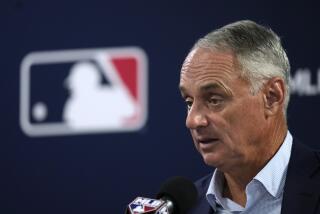Baseball owners, GMs see no labor strife on horizon
- Share via
Reporting from Orlando — No major U.S. professional sports league has been more troubled or embarrassed by labor strife than baseball. And although it may be too early to declare lasting peace in our time, it certainly looks as if there is peace for the time being.
Preliminary negotiations have already begun on a new collective bargaining agreement, one that will replace the deal between the teams and their players that expires after next season.
Unlike in years past, there are no ominous storm clouds gathering this time. At least that was the feeling coming out of this week’s owners’ and general managers’ meetings, where optimism reigned.
“I can’t forecast what’s going to happen. But you see a huge difference,” Commissioner Bud Selig said Thursday. “Both sides will be very intense and will have things that they want. But when you think about what went on for years … it was unpleasant. And it never got better for 25 years.
“Nobody ever could have dreamed that we’d have 16 years of labor peace.”
When the talks turn serious, the union — with the backing of some large-market teams — is likely to seek assurances that revenue-sharing money will be spent on payroll and not diverted elsewhere, which some small-market teams have been caught doing.
There will probably be further tweaking of rules regarding free agency, arbitration eligibility and the minimum wage as well as discussions about instant replay, expanded playoffs, a worldwide draft and a cap on bonuses offered to draft picks.
However, it’s unlikely either side feels strongly enough about any of those issues to risk a work stoppage, something baseball fans had to endure eight times between 1972 and 1995.
Rob Manfred, Selig’s top labor negotiator, said it was too early in the process to know what the key topics will be but added that he was “optimistic” the talks would produce an on-time agreement.
The union side seems hopeful too, with some of the players clearly pleased that for the first time in three decades Donald Fehr will not be involved in the negotiations. Fehr stepped down as the union chief last summer.
During his long tenure as the union’s executive director, Fehr won many important gains for the players, largely because he was a tough, uncompromising negotiator. But critics viewed that strength as a liability in his final years, when some players openly questioned his obstinacy, particularly about his objection to drug testing.
His replacement, Michael Weiner, formerly the union’s general counsel, is seen as more personable and open to compromise.
Those factors have baseball starting labor talks in a far more amicable position than the other major U.S. sports leagues. There is already talk of lockouts by the NBA and NFL, and the NHL is still trying to recover from a work stoppage that wiped out the 2004-05 season.
Even Major League Soccer narrowly averted a strike last winter, one that would have halted play in a World Cup year.
Baseball’s new contract is expected to cover five or six years, extending the game’s longest period of labor cooperation in more than four decades.
“Of all of the sports, I’d say we are the least likely to experience a work stoppage,” said Sandy Alderson, a Major League Baseball executive until the New York Mets recently hired him as general manager.
“The recent track record,” Texas GM Jon Daniels added, “is pretty good.”
There are reasons why that is so. The last work stoppage, which wiped out the 1994 World Series, so damaged the game that both sides now view a lockout as a “nuclear option” — something they might threaten but don’t plan on using.
Plus, the game has remained enormously profitable even during the recession, with Selig saying revenues are expected to approach a record $7 billion this year. And perhaps the most important factor is that the contentious issues that hampered negotiations in the past — revenue sharing, drug testing, arbitration eligibility, a salary cap — have been hammered out.
The spirit of cooperation was evident even between general managers and owners this week. Dodgers General Manager Ned Colletti said the meetings were “probably the best I’ve been a part of. A lot of time went into [hearing] everybody’s perspectives.”
Still, the teams are nowhere near a consensus on expanding the playoffs, something the GMs spent a lot of time discussing this week. And while there was no talk of expanding instant replay, several scenarios were offered for changing the draft.
Ultimately, those are issues Manfred and Weiner will have to work out. Selig, like most everyone else, is cautiously optimistic they will.
“I give Rob Manfred and Michael Weiner credit for a constructive relationship,” he said. “But we’ll see what happens.”
More to Read
Go beyond the scoreboard
Get the latest on L.A.'s teams in the daily Sports Report newsletter.
You may occasionally receive promotional content from the Los Angeles Times.











